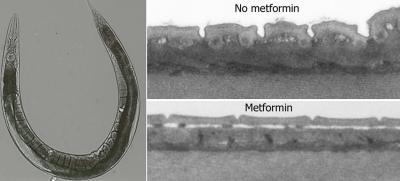A study in Proceedings of the National Academy of Sciences says that metformin, the world's most widely used anti-diabetic drug, slows aging and increases lifespan.
In their experiments, the researchers tease out the mechanism behind metformin's age-slowing effects: the drug causes an increase in the number of toxic oxygen molecules released in the cell and this, surprisingly, increases cell robustness and longevity in the long term.
Mitochondria – the energy factories in cells – generate tiny electric currents to provide the body's cells with energy. Highly reactive oxygen molecules are produced as a by-product of this process.
While these molecules are harmful because they can damage proteins and DNA and disrupt normal cell functioning, a small dose can actually do the cell good, say the researchers: "As long as the amount of harmful oxygen molecules released in the cell remains small, it has a positive long-term effect on the cell. Cells use the reactive oxygen particles to their advantage before they can do any damage," explains Belgian doctoral researcher Wouter De Haes of KU Leuven. "Metformin causes a slight increase in the number of harmful oxygen molecules. We found that this makes cells stronger and extends their healthy lifespan."

Roundworms treated with metformin show very limited size loss and no wrinkling. Credit: © Wouter De Haes
It was long thought that harmful reactive oxygen molecules were the very cause of aging. The food and cosmetics industries are quick to emphasize the 'anti-aging' qualities of products containing antioxidants, such as skin creams, fruit and vegetable juices, red wine and dark chocolate.
But while antioxidants do in fact neutralize harmful reactive oxygen molecules in the cell, they actually negate metformin's anti-aging effects because the drug relies entirely on these molecules to work.
The researchers studied metformin's mechanism in the tiny roundworm Caenorhabditis elegans, an ideal species for studying ageing because it has a lifespan of only three weeks. "As they age, the worms get smaller, wrinkle up and become less mobile. But worms treated with metformin show very limited size loss and no wrinkling. They not only age slower, but they also stay healthier longer," says Wouter De Haes. "While we should be careful not to over-extrapolate our findings to humans, the study is promising as a foundation for future research."
Other studies in humans have shown that metformin suppresses some cancers and heart disease. Metformin could even be an effective drug for counteracting the general effects of ageing, say the researchers.






Comments